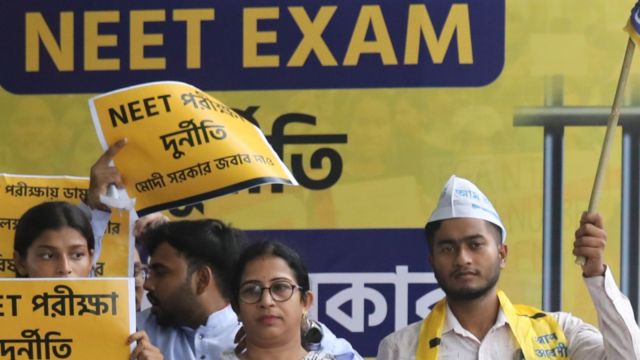
While the alleged corruption in the recent NEET exam has rightly garnered attention, the real scam lies elsewhere. There is no question that NEET and other competitive exams for higher education and recruitment exams for coveted jobs must be conducted with absolute integrity. However, as our public discourse gets mired in the minutiae of investigations, petitions, individual culpability, and political rhetoric, the most important aspect of the issue is lost: a staggering 24 lakh students appeared to qualify for a mere 1 lakh seats (around 55,000 government seats).
The real scam lies in the fact that 75 years after Independence, when India claims to be the fifth-largest economy, our systems are woefully inadequate to address the aspirations of our youth. Worse, we have foisted our failure onto them by linking this inadequate supply with the dubious categorisation of “merit,” where all but a minuscule minority is squeezed out. This is not just a problem with medical education – the same issue recurs across sectors, from education to employment. The crux of the matter is the inadequate availability of opportunities, but we sidestep it in two ways: first, by making it about our youth’s lack of merit, and then, by periodically focusing on corruption cases involving officials and young people.
It would be disingenuous to label this as merely a legacy problem, though that may be a part of it. What’s more concerning is the palpable indifference towards addressing the urgent need to productively engage our youth, both economically and democratically. Instead of tackling the issue of limited opportunities, we have ratcheted up aspiration. Since our systems don’t support the equal distribution of success and social status, we have superimposed the stupendous success of a few onto national pride and instead of acknowledging the singularity of their success, set them up as examples for our youth.
Simultaneously, we have propagated a narrow definition of success, limiting it to amassing wealth and power, while our education system and job markets have failed to provide sufficient avenues for students to legitimately fulfill these lofty aspirations. To counter this, we prop up “merit” as the criterion and celebrate the few who make the cut or have bucked the system in ways which are not available to most. For any society, restricting the attainment of success to a minority, is a recipe for fomenting discontent and alienation – a problem exacerbated in India as several young people struggle to secure basic formal employment.
The result is a vast number of disheartened youth who, despite working hard, are denied opportunities due to systemic bottlenecks – breeding a deep sense of injustice and hopelessness. When some buckle under this pressure (as seen from the spate of suicide cases in Kota), we offer anodyne platitudes about how one exam doesn’t matter. But the platitudes ring hollow because the available pathways for upward mobility are so limited.
The scale of the problem regarding the mismatch between aspirations and reality for India’s youth is massive. Yet, our current solutions lack the bi-partisan, top-down, nationwide approach that is required. We celebrate little islands of excellence, tiny drops in an ocean of demand, with no clear aim to make such opportunities widely available. We cannot lose sight of the bigger picture – the need to expand quality educational and employment opportunities.
As a nation, we need to demonstrate a sense of responsibility and empathy towards our youth. This calls for a multi-pronged approach.
First, responsible sections of the political class must rise above partisan divides to take cognisance of the scale of the problem and devise an institutional response to this challenge. At the very least, this will require a massive infusion of public funds to expand quality education infrastructure and opportunities. Second, we must shed the dismissive and exploitative attitudes towards the working class and foster a sense of social solidarity. Third, India’s elite needs to go beyond the self-satisfaction that their success is contribution enough to the nation and aim to expand opportunities for our less advantaged youth.
Only such a decisive, sustained mission, helmed by the highest leadership can instill hope and validate the aspirations of India’s youth. Merely cancelling exams and prosecuting a few individuals is to dodge accountability and will exacerbate the youth’s disillusionment.
The writer is the executive director of Future of India Foundation



